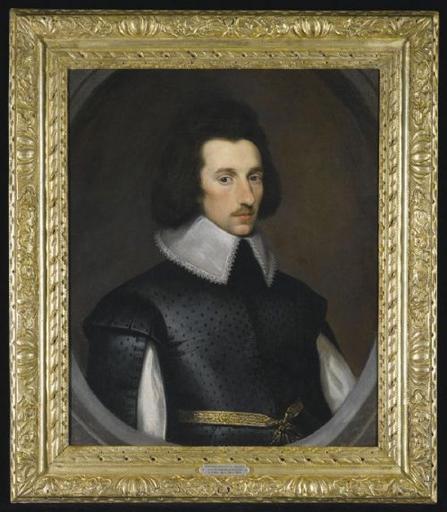MAKE A MEME
View Large Image

| View Original: | Sir_Richard_Weston.jpg (500x573) | |||
| Download: | Original | Medium | Small | Thumb |
| Courtesy of: | www.flickr.com | More Like This | ||
| Keywords: people picture frame Sir Richard Weston (1581-1652) was an English canal builder and agricultural improver. He instigated the construction of the Wey Navigation one of the first man-made navigations in Britain and introduced new plants and systems of crop rotation. Weston was the eldest son of Sir Richard Weston of Sutton, Surrey. He was educated, or spent part of his early life in Flanders. In 1613 he succeeded to the family estates at Sutton and Clandon and was knighted in 1622. He decided to copy the canal and lock system then prevalent in The Netherlands to make the River Wey navigable between Weybridge and Guildford. He was appointed one of the Royal Commissioners to oversee the work in 1635. During the English Civil War, his property was sequestrated and he took himself into exile . In 1644 he visited Ghent, Bruges and Antwerp and took the opportunity to study agricultural methods in use there. By 1649 he was back in England and instigated a bill in parliament to authorise the construction of the navigation which became an Act of Parliament in 1651. Weston immediately set to work on construction, although he died before the scheme reached completion. One of his first agricultural schemes was to increase the hay yield, by introducing a new strain of hay and by irrigation schemes. He also introduced from Flanders a crop rotation scheme based on clover, flax and turnips. In 1645 he had written an account of Flemish husbandry which formed the basis of the "Discours" which was published in various versions in 1651 and 1652. Weston died aged 61 and was buried at Trinity Chapel Guildford. He married Grace Harper of Cheshunt and by her had seven sons and two daughters. Sir Richard Weston (1581-1652) was an English canal builder and agricultural improver. He instigated the construction of the Wey Navigation one of the first man-made navigations in Britain and introduced new plants and systems of crop rotation. Weston was the eldest son of Sir Richard Weston of Sutton, Surrey. He was educated, or spent part of his early life in Flanders. In 1613 he succeeded to the family estates at Sutton and Clandon and was knighted in 1622. He decided to copy the canal and lock system then prevalent in The Netherlands to make the River Wey navigable between Weybridge and Guildford. He was appointed one of the Royal Commissioners to oversee the work in 1635. During the English Civil War, his property was sequestrated and he took himself into exile . In 1644 he visited Ghent, Bruges and Antwerp and took the opportunity to study agricultural methods in use there. By 1649 he was back in England and instigated a bill in parliament to authorise the construction of the navigation which became an Act of Parliament in 1651. Weston immediately set to work on construction, although he died before the scheme reached completion. One of his first agricultural schemes was to increase the hay yield, by introducing a new strain of hay and by irrigation schemes. He also introduced from Flanders a crop rotation scheme based on clover, flax and turnips. In 1645 he had written an account of Flemish husbandry which formed the basis of the "Discours" which was published in various versions in 1651 and 1652. Weston died aged 61 and was buried at Trinity Chapel Guildford. He married Grace Harper of Cheshunt and by her had seven sons and two daughters. | ||||